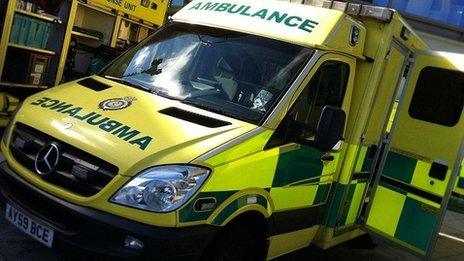Fire Brigades Union concern over east of England ambulance delays
- Published

East of England Ambulance Service said it had plans to improve response times
Paramedics sent to emergencies in the east of England are often on their own and unable to take seriously injured people to hospital, it has been claimed.
The Fire Brigades Union (FBU) has criticised the way the East of England Ambulance Service deals with 999 calls.
It comes after police in the region revealed ambulance delays had led to them taking patients to hospital.
East of England Ambulance Service said it had plans to improve response times.
Keith Handscomb, of East Anglia FBU, said: "We applaud the skills and commitment of the professional paramedics and ambulance crews we work alongside but fire crews are telling us something is going seriously wrong with the 999 response of the East England Ambulance Service (EEAS).
"Fire crews tell us they and casualties are waiting longer and longer for the arrival of paramedics and ambulances," he said.
'Afraid to speak'
"When a paramedic does arrive, they are often on their own in a car or on a motorbike and are unable to take seriously injured casualties to hospital.
"Fire officers tell us of their desperate frustration at being told to wait in line when chasing up emergency requests for the attendance of an ambulance," said Mr Handscomb.
"Sometimes they are told the ambulance sent to their emergency has been redirected to another call due to there being no other ambulance available.
"And we have received reports where EEAS have sent a private ambulance to casualties in a road traffic accident without either of the crew apparently having the professional medical skills needed to deal with the emergency.
"Paramedic colleagues have told us privately about their concerns but they are afraid to speak out."
An EEAS spokesman said: "Often it is not the case that ambulances are unavailable, simply that the information we are given from the scene indicates a non emergency, so the patient is given a longer waiting time than one in a life-threatening condition under the national prioritisation system.
"We have already revealed plans to improve our response times with a raft of measures.
"But it is important to remember response targets are set from between eight minutes to an hour according to thoroughly assessed clinical need and, while a longer target may not be ideal for police and fire crews, it means those in life-threatening situations are prioritised, similar to the way they are at accident and emergency to get life-saving help first.
"We want to do everything possible as emergency services to help one another, and we take genuine delays seriously so would therefore urge concerned fire and police officers to contact us about specific case details so it can be properly investigated."
- Published25 January 2013
- Published18 January 2013
- Published1 November 2012
- Published11 January 2012
- Published5 October 2011